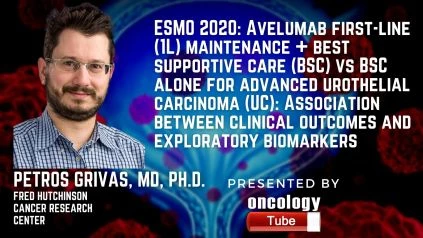Petros Grivas, MD, Ph.D. of the University of Washington; Fred Hutchinson Cancer Research Center speaks about the ESMO 2020 abstract Avelumab first-line (1L) maintenance + best supportive care (BSC) vs BSC alone for advanced urothelial carcinoma (UC): Association between clinical outcomes and exploratory biomarkers.
Abstract 699O
Context
Avelumab (anti-PD-L1 IgG1 antibody) 1L maintenance + BSC substantially extended overall survival ( OS) in the phase 3 JAVELIN Bladder 100 (NCT02603432) study vs BSC alone in patients (pts) with advanced disease-free UC progression with 1L induction chemotherapy in both randomized pts and pts with PD-L1 + tumors. We publish studies of exploratory biomarkers.
Methodology
Prior to randomization, tumor biopsies were obtained. Tumor studies included immunohistochemistry of PD-L1 (Ventana SP263 assay) and CD8, whole-exome sequencing (including genotypes of FCGR2A and FCGR3A), whole-transcriptome sequencing, and sequencing of T-cell receptors (TCR). Baseline C-reactive protein (CRP) level and neutrophil: lymphocyte ratio (NLR) as well as TCR sequencing were included in peripheral blood examination before and after treatment. Using the Cox proportional hazards model, associations between OS or progression-free survival and biomarkers were evaluated. Danger ratios and nominal p values were registered and no changes to multiplicity were made (statistical significance level of 5 percent).
Outcomes
Increased OS gain with avelumab 1L maintenance + BSC vs BSC alone was positively correlated with invasive margin or tumor center CD8 + T cells, high tumor mutation burden, and innate and adaptive immune response signatures of tumor gene expression. The number of FCGR2A / FCGR3A alleles encoding high-affinity Fcγ receptors for IgG1 was also positively correlated with increased OS advantage. Avelumab’s OS benefits were negatively correlated with tumor epithelial cell gene signatures, fibroblast growth factor receptor signaling mutations, CRP, and NLR. Lower expression of TGFb was correlated with greater OS gain for avelumab in pts with elevated immune gene expression signatures. Further studies, including findings of exploratory PD-L1 cutoffs in tumor vs. immune cells, will be provided.
Findings
The OS benefits of the maintenance of avelumab 1L in pts with advanced UC are positively correlated with immune response biomarkers and negatively associated with tumor homeostasis and chronic inflammation biomarkers.
Identification of Clinical Trial
NCT02603432. NCT0.

